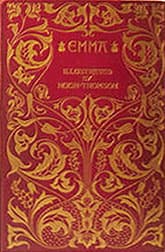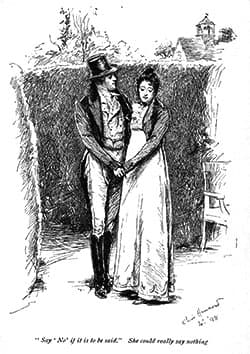Emma
Critique • Quotes • At the movies
 1897 edition
1897 editionFirst publication
1815
Literature form
Novel
Genres
Literary, romance
Writing language
English
Author's country
England
Length
Approx. 155,000 words
Love and unlikability
If you're not a Jane Austen admirer, Emma could be her novel you most despise. But if you are a fan, Emma is likely the one you think best shows how adept a writer she was.
Austen set out in the last of the works published during her life to make its main character quite unliked. Emma Woodhouse appears as the archetypal Austen heroine: an unmarried daughter in a well-to-do family, engaged in the social affairs of the landed gentry in a small corner of England, with little if any thought for anything beyond the marital prospects of her friends and family, full of her own apparent insight into the human heart—and hopelessly self-deluded about her own romantic possibilities.
The very beginning of Emma is enough to turn off Austen's detractors, quickly setting up the picture of the smug, wealthy young woman of limited experience. It can read as if the author is saying, yes, I know this is what you're expecting in one of my novels, but I'm going to make you fall in love with her anyway—as usual.
As the plot develops, the stakes are ratcheted up as Emma Woodhouse becomes an even more maddening figure.
It is through her eyes and ears that we experience her small world. It is through her thoughts we are given a self-congratulatory analysis of the relationships around her, especially those involving her own condescending efforts as matchmaker.
In the first part of the novel, she befriends a naïve young woman and tries to set her up for what seems a good match with an upper-class twit of impeccable manners. I don't think it is a spoiler to say the gentleman's sights are actually set upon Emma herself, since every reader is bound to realize this quickly. At times, you want to reach into the pages and slap some sense into the blithely unaware Emma as she preens over her imagined social skills. But the episode ends in the embarrassing disaster you've been dreading.
I can't help but think this reveal is too obviously signalled by Austen, though I'm aware her legion of loyal readers probably chalk it up to her skill at intentionally making a fool of Emma while retaining reader interest in her future development. And I admit my own feeling that I understood her situation better than she did kept me reading toward that inevitable moment when she would get her comeuppance.
Emma takes the disaster with the appropriate self-criticism. She carries on in her error-filled social maneuvers but with a dash of doubt in her mental makeup.
For some—me included—this personal growth comes too slowly. Emma continues as one annoying literary character. It's painful being trapped in her ever-scheming, though misguided, mind.
After that first big romantic letdown, Emma becomes progressively less urgent reading. The narrative turns repetitive as Austen focuses on developing the characters around Miss Woodhouse, as filtered through her perceptions.
None of those characters are really engaging. Her father, Henry Woodhouse, is a hypochondriac, obsessed with his own and his friends' health—he never really varies from this single note.
Emma's close friend and in-law George Knightley does go through an abrupt, radical transformation in Emma's eyes near the end of the novel, but again this is signalled obviously by Austen. He never evolves much for readers and remains the same considerate, if stolid, character throughout. And a bit of a mystery: why in the world does such a sensible man love—or even like—such a woman as Emma?
Twittering on
Two other characters reveal a secret relationship, but we're not led to care much about them. Probably a wise move by Austen, since their affair could prove much more interesting than any of Emma's circle and they would steal the novel. (One author has indeed written such a novel, a sequel of sorts focusing on just these two.)
A whole host of other figures in this novel's world seem to twitter on at the repetitive social engagements of their insubstantial lives without having any demonstrable impact on Emma or on us. It's hard to keep up interest in such a desultory group, without much of a narrative driving us on.
However, as Austenites know, it's all bound to work out in the end—likely with wedding bells. (Note the "perfect happiness of the union" in the last line.) For them, the frustrations along the way make the destiny all the more appreciated. The deeper failings than usual for an Austen character make Emma's resurgence all the more a matter for celebration.
I have a sneaking admiration for the author for being able to pull this off. And for having tried it in the first place. She could have gotten away with repeating any of her previous well-regarded novels and their admirable leading ladies. Instead she challenges herself and her readers with an exaggerated version.
But does she pull it off? Don't the multiple happy endings of the novel come too conveniently? Wouldn't a movingly tragic ending have better suited? Might it have delivered an appropriate payoff for having faltered through all the boring pages up to that point?
This, however, would not have suited the readers of Jane Austen's time. Nor the multitudes ever since then who have considered Emma one of their favourite books of all time.
— Eric
Critique • Quotes • At the movies


